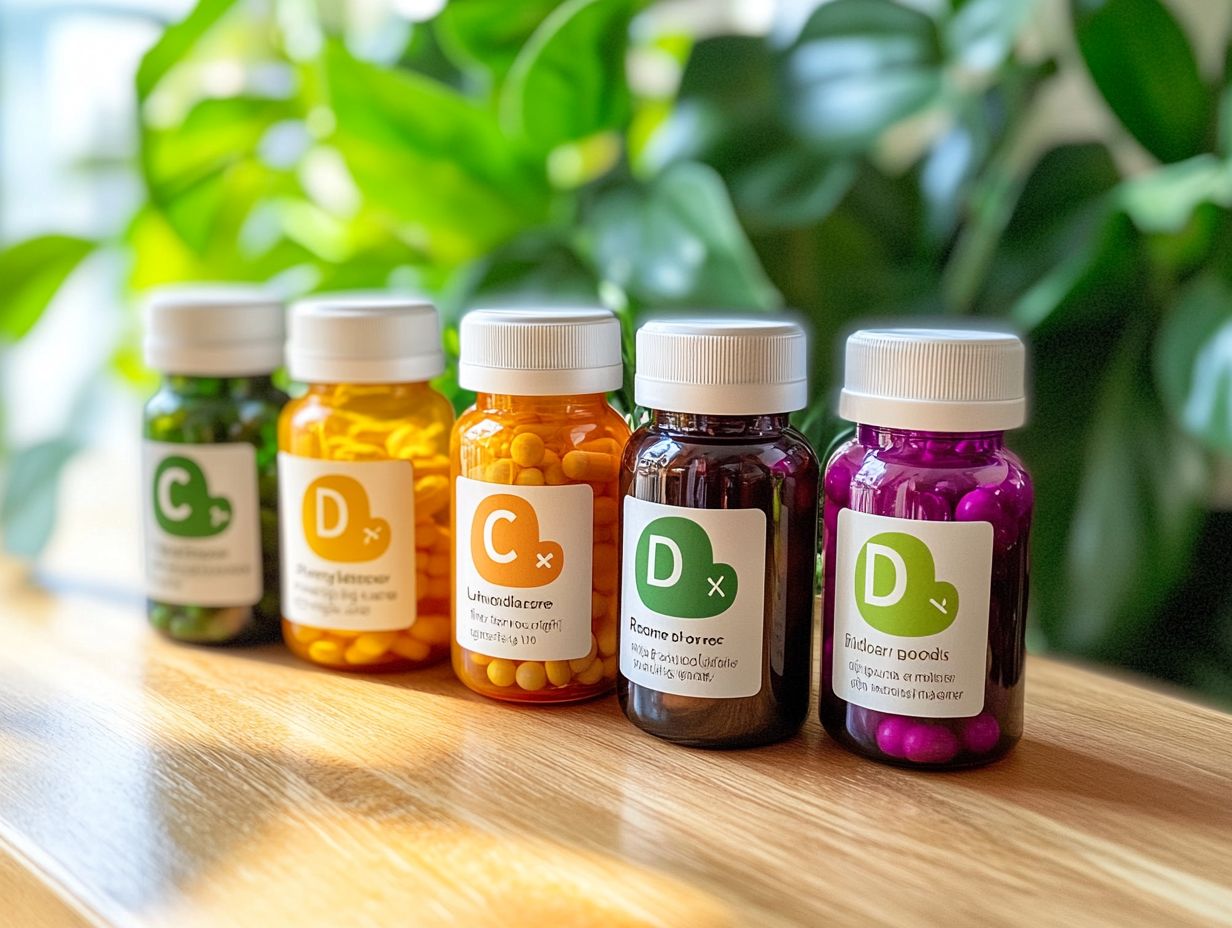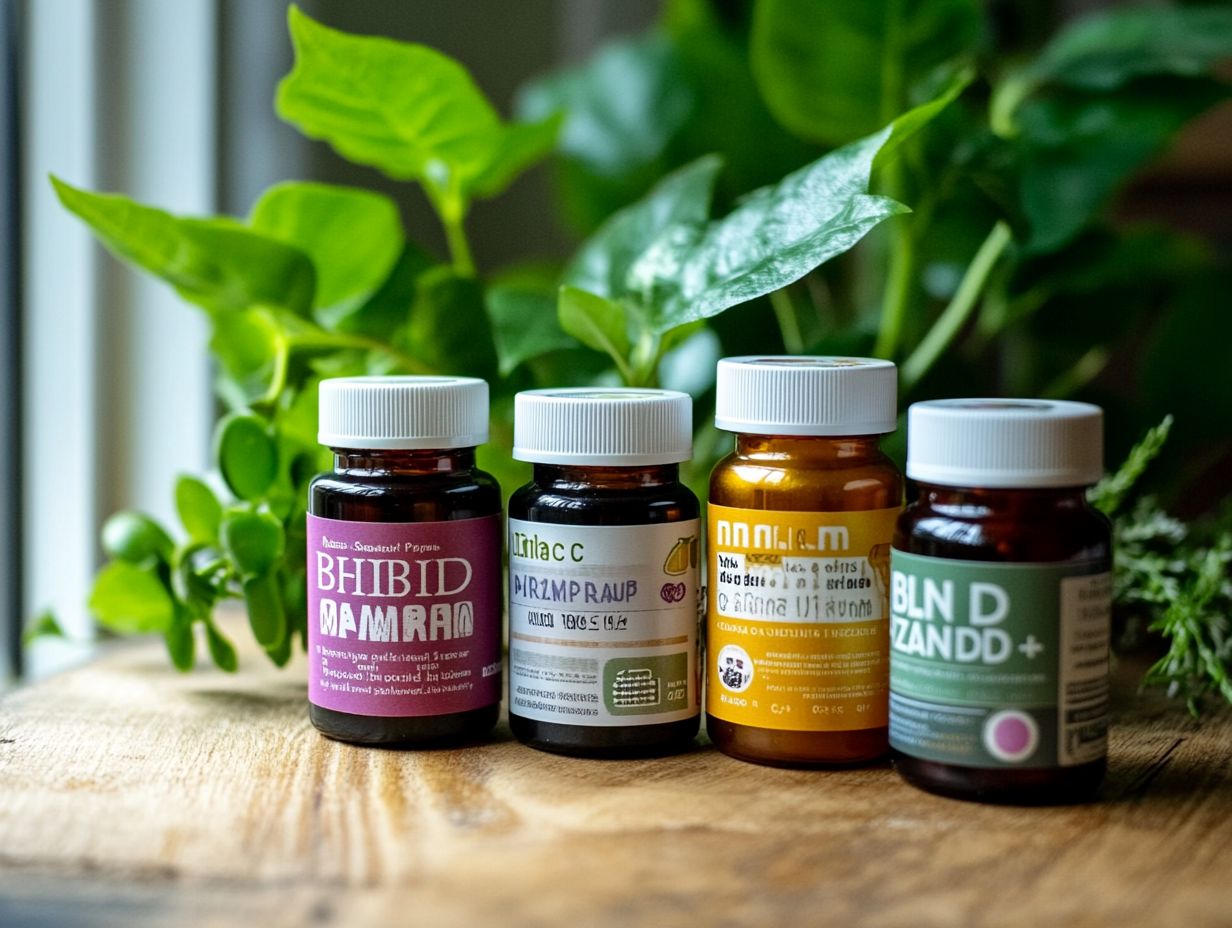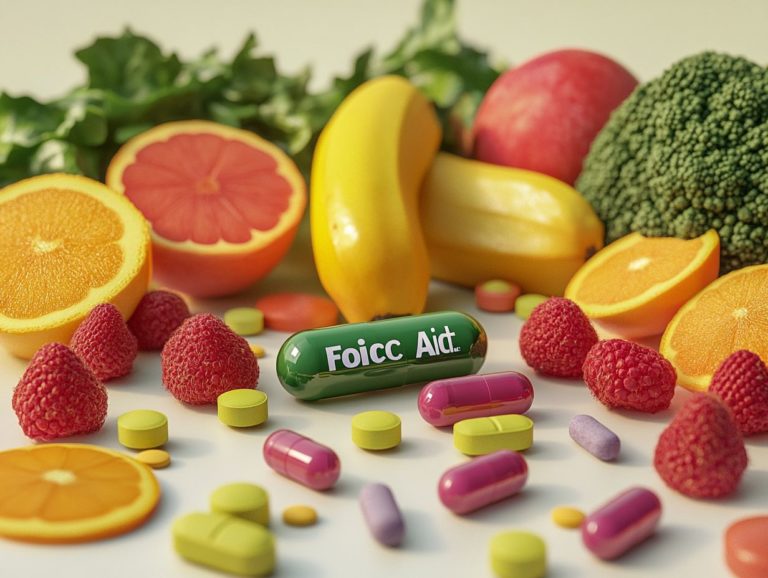5 Supplements for Enhanced Immune Function
In today s fast-paced world, maintaining a robust immune system is more crucial than ever. With numerous supplements claiming to enhance immunity, it can feel overwhelming to know where to begin.
Discover five powerful options that can supercharge your immune system Vitamin C, Zinc, Probiotics, Vitamin D, and Echinacea each celebrated for their immune-boosting benefits. This article also highlights the essential role of your immune system, signs that your defenses might be weakening, the potential advantages of these supplements, and practical tips for seamlessly incorporating them into your lifestyle.
Explore how you can effectively support your health and well-being!
Contents
Key Takeaways:

- Vitamin C boosts your immune function by helping produce white blood cells and antibodies. Supplementing with 1000mg daily can enhance your immune response.
- Zinc is vital for immune cell development and function. Taking 30-50mg daily can improve immune function and reduce the severity of infections.
- Probiotics are beneficial bacteria that support a healthy gut, essential for a strong immune system. Look for a supplement with at least 10 billion colony-forming units (CFUs) and take daily.
1. Vitamin C
Vitamin C is a powerhouse antioxidant that plays a crucial role in boosting your immune health. It enhances the function of your immune cells and helps reduce the severity of cold symptoms.
This essential nutrient also supports collagen production, vital for healing and maintaining skin barriers that defend against harmful pathogens. You ll find Vitamin C abundantly in dietary sources like citrus fruits, including oranges and grapefruits, as well as in vibrant vegetables like broccoli and bell peppers.
Registered dietitian Julia Zumpano notes that incorporating these foods into your diet can significantly strengthen your body s natural defenses. Research indicates that individuals who maintain adequate Vitamin C intake may enjoy shorter illnesses and milder symptoms, highlighting its role in illness prevention.
Incorporating Vitamin C-rich foods into your routine is a straightforward yet remarkably effective approach to supporting your overall health.
2. Zinc
Zinc is an essential mineral that enhances immune function and supports various immune response mechanisms. This nutrient is involved in numerous biochemical processes that enable your body to fend off infections and diseases.
Incorporating dietary sources rich in zinc, such as oysters and legumes, is an excellent strategy to ensure you’re getting enough of this crucial mineral. By helping to reduce inflammation, zinc plays a key role in preventing chronic illnesses, safeguarding your overall well-being.
A deficiency in zinc compromises your immune function and increases your susceptibility to infections. It’s essential to maintain sufficient levels of this vital mineral for a resilient immune system.
3. Probiotics
Probiotics are the beneficial bacteria your body craves, supporting gut health and enhancing your overall immune system. They help minimize health risks linked to chronic inflammation.
These microorganisms stimulate the production of specific antibodies and fine-tune immune response mechanisms, making your body more adept at fending off infections. They achieve this by balancing your gut microbiome, essential for effective immune function.
You can find dietary sources rich in these beneficial bacteria in everyday foods like:
- Yogurt
- Kefir
- Sauerkraut
- Kimchi
Incorporating these into your daily meals is easy. If you’re not getting enough probiotics from your diet, supplements can provide a concentrated source to boost your immunity. These supplements deliver a powerful blend of strains designed to optimize your immune system and promote a healthier microbiome.
4. Vitamin D

Vitamin D is essential for maintaining a robust immune system. It plays a pivotal role in your immune response and helps fend off vitamin deficiencies that could pose health risks.
You can get Vitamin D primarily through sunlight exposure. Your skin naturally produces this nutrient when exposed to sunlight. You can also find it in fortified foods like dairy products, cereals, and certain types of fish.
Studies have shown a clear connection between adequate Vitamin D levels and enhanced immune function. Individuals with sufficient amounts are less likely to develop respiratory infections and other illnesses.
Research has established a link between Vitamin D deficiency and an increased risk of chronic diseases, including cardiovascular conditions and autoimmune disorders. Maintaining optimal Vitamin D levels is crucial for your health.
5. Echinacea
Echinacea is a well-regarded herbal supplement celebrated for its immune-boosting properties. It is often utilized to ward off illness and enhance your body s response to infections.
This remarkable plant hails from North America. It has garnered significant attention for its potential to reduce the duration and severity of common colds. Echinacea may stimulate various immune functions.
Research indicates that Echinacea may bolster the production of white blood cells, which are essential in fending off pathogens.
For optimal results, the recommended dosage typically ranges from 300 to 500 mg of standardized extract. It is taken two to three times a day during the cold season. While most individuals tolerate Echinacea well, some may encounter mild side effects, such as gastrointestinal discomfort or allergic reactions.
Incorporating this natural remedy could be a valuable strategy for anyone seeking to fortify their immune defenses.
What Is the Role of the Immune System in the Body?
Your immune system acts as your body’s vigilant defense against pathogens. It plays a crucial role in identifying and neutralizing harmful invaders while maintaining the delicate balance needed to prevent chronic inflammation and autoimmune diseases.
Various immune cells collaborate seamlessly to uphold this defense. T-cells, a type of white blood cell that fights infections, take center stage in destroying infected cells and orchestrating the overall immune response.
A healthy immune system is essential for your overall well-being. It not only shields you from infections but also enhances your body s ability to heal from injuries.
Several factors, including nutrition, hydration, and lifestyle choices, significantly influence immune health. A balanced diet rich in vitamins, minerals, and antioxidants supports the production and function of these vital immune cells.
Adequate hydration is equally critical, as it facilitates nutrient transport and toxin removal. Regular physical activity boosts circulation and strengthens immune surveillance.
When all these elements come together, they create a robust system capable of responding effectively to any threats that come your way.
What Are the Signs of a Weak Immune System?
Signs of a weak immune system may manifest as frequent infections and prolonged illness. You may also experience an increased susceptibility to autoimmune diseases, indicating that your body’s ability to fend off pathogens is compromised.
These symptoms serve as significant warning signs, suggesting that your defense mechanisms are not operating at their best. If you find yourself grappling with everyday colds or the flu more often, your overall health may also be at risk due to a greater likelihood of developing chronic conditions.
To strengthen your immune function, it s crucial to embrace a nutrient-rich diet abundant in vitamins and antioxidants, especially those found in vibrant fruits and vegetables. Coupled with this, incorporating regular physical activity and managing stress through mindfulness practices can elevate your overall health, making it easier for your body to ward off illness.
How Can Supplements Help Boost Immune Function?

Dietary supplements can significantly enhance your immune function. They offer essential nutrients that might be missing from your typical diet, elevating your overall nutritional status.
Think of these supplements as your vital allies in strengthening your body s defenses. This is especially true when facing challenges from stress from our surroundings and seasonal shifts.
For instance, Vitamin C is renowned for its antioxidant properties. It is often recommended at a dosage of 500 to 1000 mg per day, which boosts the production of the white blood cells essential for combating infections.
Zinc supplements are usually suggested at about 15 to 30 mg daily. They not only help maintain your immune system but also aid in wound healing.
Probiotics are another great option. They promote gut health with dosages that can vary widely; a daily intake of 1 billion to 10 billion CFUs (colony-forming units) is commonly recommended.
It’s crucial to consult with doctors or health experts. These supplements can interact with certain medications, potentially affecting their effectiveness or causing unwanted side effects.
What Are the Recommended Dosages for These Supplements?
Recommended dosages for immune-boosting supplements can vary significantly. Factors like age, gender, and health status play a role. It s vital to consult a healthcare professional to pinpoint the right amount for optimal immune support.
This approach allows you to customize your intake according to your specific needs. Whether that’s Vitamin C, zinc, probiotics, or other beneficial nutrients, it s all about finding the right balance.
For instance, you ll typically need about 65-90 mg of Vitamin C per day. Zinc requirements can range from 8-11 mg, depending on your gender.
Regarding probiotics, the amounts can fluctuate considerably, often between 1 billion to 100 billion CFUs. However, be cautious exceeding these recommended limits might lead to digestive discomfort or other unwanted side effects.
Staying mindful of these guidelines is essential for maintaining balance. Consuming too much can sometimes do more harm than good.
Are There Any Risks or Side Effects to Taking These Supplements?
While dietary supplements can enhance your immune health, it s essential to be aware of the potential risks and side effects that come with their use. This underscores the importance of adhering to proper dosages and seeking medical guidance.
Take Vitamin C, for example. Although it s celebrated for its antioxidant properties, it can lead to digestive issues like diarrhea and stomach cramps when taken in excess.
Similarly, zinc is often hailed for its immune-boosting capabilities. However, it may also cause nausea, a metallic taste, and, if overconsumed, longer-term issues such as copper deficiency.
The interactions between these supplements and certain medications can complicate matters further. This may result in diminished effectiveness or intensified side effects.
Thus, it’s vital to approach supplementation with caution. Ideally, do so under the guidance of a healthcare professional to protect yourself from potential health complications.
What Other Lifestyle Changes Can Help Support Immune Function?
Along with dietary supplements, lifestyle changes are essential for supporting your immune function. Maintaining a healthy diet, staying well-hydrated, and managing stress can make a notable difference.
Consider adopting a balanced diet filled with a variety of colorful fruits and vegetables. These powerhouses provide essential vitamins and antioxidants that serve as your body s first line of defense.
Prioritizing adequate sleep is equally important. It allows your body to repair and rejuvenate, ultimately enhancing your immune response.
Regular exercise lifts your mood and energy levels. It also improves circulation and aids in toxin elimination.
To further bolster your immune health, you might want to incorporate these practical tips into your routine:
- Drink enough water throughout the day.
- Engage in mindfulness practices to effectively manage stress.
- Be vigilant about hand hygiene.
Frequently Asked Questions

What are the top 5 supplements for enhanced immune function?
The top five supplements for better immune health are vitamin C, vitamin D, zinc, probiotics, and elderberry.
How does vitamin C help enhance immune function?
Vitamin C is a strong antioxidant. It boosts white blood cell production, which is crucial for fighting infections.
Why is vitamin D important for immune function?
Vitamin D regulates the immune system. It also helps protect against respiratory infections and other illnesses.
What is the role of zinc in enhancing immune function?
Zinc is vital for immune cell development and function. It also helps reduce inflammation in the body.
Can probiotics really boost immune function?
Yes! Probiotics are beneficial bacteria that strengthen the immune system. They protect against harmful germs.
How does elderberry support immune function?
Elderberry is rich in antioxidants and anti-inflammatory compounds. It helps enhance immune function and protects against respiratory infections.






